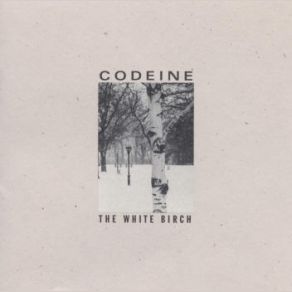The White Birch
Download links and information about The White Birch by Codeine. This album was released in 1994 and it belongs to Rock, Indie Rock, Alternative genres. It contains 9 tracks with total duration of 43:03 minutes.

|
|
|---|---|
| Artist: | Codeine |
| Release date: | 1994 |
| Genre: | Rock, Indie Rock, Alternative |
| Tracks: | 9 |
| Duration: | 43:03 |
| Buy it NOW at: | |
| Buy on iTunes $8.91 | |
| Buy on Amazon $8.91 | |
Tracks
[Edit]| No. | Title | Length |
|---|---|---|
| 1. | Sea | 7:21 |
| 2. | Loss Leader | 4:18 |
| 3. | Vacancy | 3:37 |
| 4. | Kitchen Light | 3:36 |
| 5. | Washed Up | 4:40 |
| 6. | Tom | 5:02 |
| 7. | Ides | 5:07 |
| 8. | Wird | 6:05 |
| 9. | Smoking Room | 3:17 |
Details
[Edit]The final Codeine release, The White Birch, finds the band stretching out more beyond its usual style here and there, while still pretty much sounding like it always has. It's not quite a case of "heard one, heard them all," but at points, it's hard to see how they would have continued without completely repeating themselves. There is a slight change in the lineup, with Douglas Scharin replacing Chris Brokaw, at that time fully involved with Come, on drums, while David Grubbs once again guests, playing guitar on "Tom" and "Wird." He's not fully noticeable on either track per se, but his playing doesn't take away anything from the overall mood or performance either. John Engle's own lead guitar work here often has a stronger, stentorian sense of playing than before, in part resulting from the greater sense of space in a number of songs. While there was a relative calm on moments of Frigid Stars, here there's even more of it — it's not quite relaxed, but allows more stripped-down moments to come in along with the thicker roil of cuts like "Vacancy" and the searing, compressed snarl on "Washed Up." The opening cut "Sea" captures that well, especially given that Stephen Immerwahr's vocals are as lost and murky in the mix as they've ever been. Other moments betray what sounds like a Slint touch here and there, not surprising given the Louisville connection via Grubbs and others (indeed, Louisville as a whole is specifically thanked in the credits). Scharin, meanwhile, throws in a couple of extra fills and subtle touches along the way, though whether this results from what he brings to the band or just a change in style is not immediately apparent. Ending with the soft contemplation of "Smoking Room," White Birch sees out Codeine's career on a strong enough note.